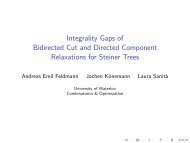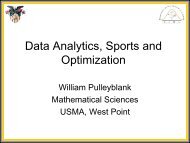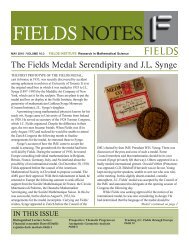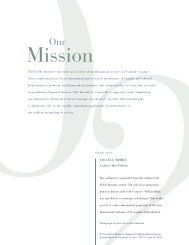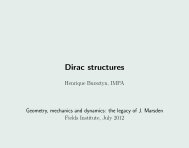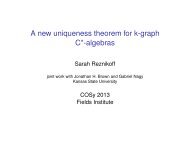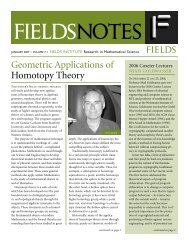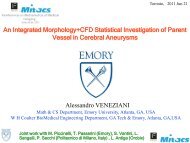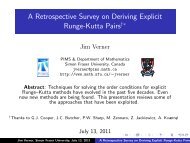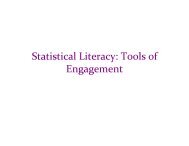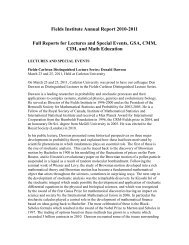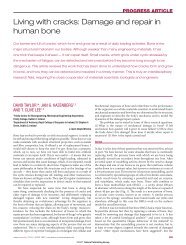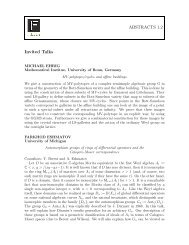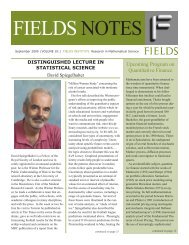Annual Report 2005 - Fields Institute - University of Toronto
Annual Report 2005 - Fields Institute - University of Toronto
Annual Report 2005 - Fields Institute - University of Toronto
You also want an ePaper? Increase the reach of your titles
YUMPU automatically turns print PDFs into web optimized ePapers that Google loves.
About ninety participants from all over the world gathered<br />
in <strong>Toronto</strong> for this symposium. It featured eight invited<br />
talks, seven minisymposia with 3–4 talks each; about 30<br />
contributed talks, as well as 15 student contributions in the<br />
student paper competition. Topics ranged from core iterative<br />
methods and eigenvalues to preconditioning, multigrid<br />
and parallel computation, as well as optimization, nonlinear<br />
equations and differential equations. Applications such<br />
as data and web mining, image processing, computational<br />
finance and computational fluid dynamics received special<br />
attention.<br />
The symposium received funding from the <strong>Fields</strong> <strong>Institute</strong>,<br />
the Faculty <strong>of</strong> Mathematics at the <strong>University</strong> <strong>of</strong> Waterloo<br />
and MITACS, so that 13 applications for funding by<br />
students and postdoctoral fellows were at least partially<br />
funded, and five awards were given to student paper competition<br />
winners.<br />
The Bahen Centre for Information Technology (BCIT)<br />
at the <strong>University</strong> <strong>of</strong> <strong>Toronto</strong> served as hosting venue. The<br />
high-ceiling hallways <strong>of</strong> BCIT were the ideal place for<br />
informal discussions and breaks, while the projectors in the<br />
rooms booked for the conference were working full-time<br />
during scientific sessions. Many participants indicated<br />
their appreciation <strong>of</strong> the high quality <strong>of</strong> the talks and the<br />
interaction provided by the conference. A special issue <strong>of</strong><br />
the Applied Numerical Mathematics journal, arising from<br />
the symposium, will be sponsored by IMACS. On the social<br />
front, participants enjoyed the hospitality <strong>of</strong> the downtown<br />
Chinatown and <strong>of</strong> the Greek village on the Danforth, as<br />
well as the ethnic diversity and colour <strong>of</strong> Baldwin Street.<br />
Invited Speakers:<br />
Tony Chan (UCLA)<br />
Duality-based iterative methods for total variation minimization<br />
Tom Coleman (Cornell)<br />
Minimizing VaR, CVaR and hedging issues for a portfolio <strong>of</strong><br />
derivatives<br />
Andrew Conn (IBM)<br />
Derivative free optimization – some new results<br />
Paul Fischer (Argonne National Laboratory)<br />
Spectral element multigrid for the incompressible Navier<br />
Stokes equations<br />
G e n e r a l S c i e n t i f i c A c t i v i t i e s<br />
Ilse Ipsen (North Carolina)<br />
Analysis and computation <strong>of</strong> Google’s page rank<br />
Tim Kelley (North Carolina)<br />
Continuation algorithms for parameter dependent compact<br />
fixed point problems<br />
Kees Oosterlee (DIAM)<br />
A novel multigrid based preconditioner for heterogeneous<br />
Helmholtz problems<br />
Andy Wathen (Oxford)<br />
Fast solvers for incompressible flow<br />
Workshop on Mathematical Modeling and Analysis <strong>of</strong><br />
Computer Networks<br />
May 6, <strong>2005</strong><br />
Held at the <strong>University</strong> <strong>of</strong> Waterloo<br />
Organizers: Shie Mannor (McGill) and Peter Marbach<br />
(<strong>Toronto</strong>)<br />
This one-day workshop was part <strong>of</strong> the IFIP conference<br />
Networking <strong>2005</strong> held at the <strong>University</strong> <strong>of</strong> Waterloo. The<br />
workshop brought together researchers with a background<br />
in mathematics and/or computer networks in order to<br />
explore how mathematics can be used to model and analyze<br />
these networks.<br />
Mathematical models have played an important role in the<br />
understanding <strong>of</strong> computer networks – in particular in the<br />
understanding <strong>of</strong> their fundamental performance limits<br />
and <strong>of</strong> the trade-<strong>of</strong>fs involved. Because the network infrastructure<br />
keeps changing and new applications emerge,<br />
the mathematical models used need to evolve as well. The<br />
goal <strong>of</strong> the workshop was to explore recent advances in<br />
the mathematical modeling and analysis <strong>of</strong> computer<br />
networks.<br />
The talks represented recent work on topics such as<br />
network coding, mobility models for wireless networks,<br />
auction mechanism for spectrum sharing in cellular networks,<br />
and the spreading <strong>of</strong> internet worms. Mathematical<br />
models used to study these issues ranged from stochastic<br />
models (random walks and Brownian motion, diffusion<br />
processes, large deviation) to optimization (such as geometric<br />
programming and semi-definite programming) and<br />
game theory.<br />
<strong>Fields</strong> <strong>Institute</strong> <strong>2005</strong> ANNUAL REPORT 76



